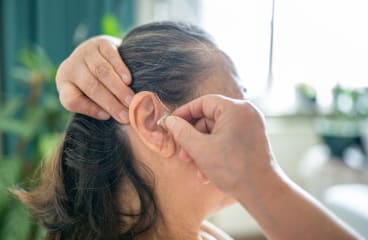
What are they?
Over-the-counter (OTC) hearing aids are ones you can buy without having a hearing test or visiting a doctor. OTC hearing aids can help you hear better. They can be adjusted to help with the type of hearing loss you have. They may be an option if you have mild to moderate hearing loss.
Who can use them?
OTC hearing aids are for adults age 18 or older with mild to moderate hearing loss. You might have this type of hearing loss if:
- Speech or other sounds seem muffled.
- It's hard for you to hear when you're in a group or a noisy area, are on the phone, or can't see who is talking.
- You ask others to speak more clearly, talk louder, or repeat what they said.
- You turn up the volume higher than other people prefer when listening to TV, music, or the radio.
OTC hearing aids should not be used if you:
- Are under age 18.
- Notice pain or discharge coming out of your ear.
- Feel like you or your surroundings are spinning (vertigo).
- Have ringing or roaring in your ear (tinnitus).
- Have hearing loss that's worse on one side or is only on one side.
- Have sudden hearing loss.
- Have severe hearing loss. You might have this type of hearing loss if:
- You can only hear loud speech—even when the area is quiet or when someone is close to you.
- It's very hard for you to hear others when it's noisy.
How do they work?
These hearing aids will need to be adjusted by you. It may take some trial and error to set things up right for you. An audiologist may be able to help you adjust these devices. It depends on where you bought your device. Buying directly from a hearing professional may offer you better support.
How can you choose one?
There isn't one OTC hearing device that's right for everyone. What works for one person may not work for you and the type of hearing loss you have.
Here are some tips for choosing OTC hearing aids.
- Get your hearing tested.
You can get a hearing test online or from an audiologist. This may be the best way to know if OTC hearing aids will work for you.
- Buy from a trusted source.
Talk to your doctor or audiologist. They may have resources that can help you decide which device to buy and where to get it.
- Look for a good return policy.
It takes time for your brain to adjust to the new sounds it's hearing. Try to find a device with a return policy that gives you enough time to test it out.
Where can you learn more?
Go to http://www.healthwise.net/patientEd
Enter B388 in the search box to learn more about "Learning About Over-the-Counter (OTC) Hearing Aids".
Current as of: October 27, 2024
Author: Ignite Healthwise, LLC Staff
Clinical Review Board
All Ignite Healthwise, LLC education is reviewed by a team that includes physicians, nurses, advanced practitioners, registered dieticians, and other healthcare professionals.

